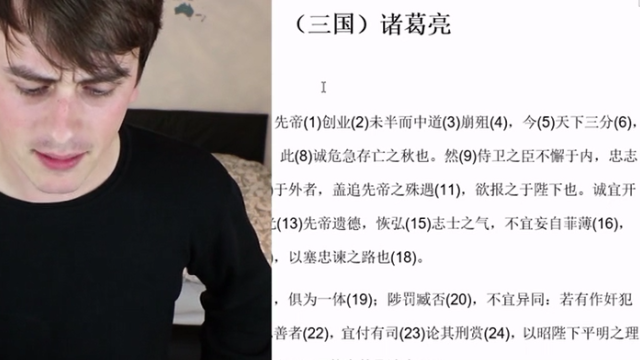【经典名著阅读】《红字》第二章(下)
作者:Nathaniel Hawthorne
2011-08-01 20:42
Yet there were intervals when the whole scene, in which she was the most conspicuous object, seemed to vanish from her eyes, or at least, glimmered indistinctly before them, like a mass of imperfectly shaped and spectral images. Her mind, and especially her memory. was preternaturally active, and kept bringing up other scenes than this roughly hewn street of a little town, on the edge of the Western wilderness; other faces than were lowering upon her from beneath the brims of those steeple-crowned hats. Reminiscences, the most trifling and immaterial, passages of infancy and school-days, sports, childish quarrels, and the little domestic traits of her maiden years, came swarming back upon her, intermingled with recollections of whatever was gravest in her subsequent life; one picture precisely as vivid as another; as if all were of similar importance, or all alike a play. Possibly, it was an instinctive device of her spirit, to relieve itself, by the exhibition of these phantasmagoric forms, from the cruel weight and hardness of the reality.
然而,在她充当众目所瞩的目标的全部期间,她不时感到眼前茫茫一片,至少,人群象一大堆支离破碎、光怪陆离的幻象般地朦胧模糊。她的思绪,尤其是她的记忆,却不可思议地活跃,越出这蛮荒的大洋西岸边缘上的小镇的祖创的街道,不断带回来别的景色与场面;她想到的,不是那些尖顶高帽帽植下藐视她的面孔。她回忆起那些最琐碎零散、最无关紧要的事情;孩提时期和学校生活,儿时的游戏和争哆,以及婚前在娘家的种种琐事蜂拥回到她的脑海,其中还混杂着她后来生活中最重大的事件的种种片断,一切全都历历如在目前;似乎全都同等重要,或者全都象一出戏。可能,这是她心理上的一种本能反应:通过展现这些备色各样、变幻莫测的画面,把自己的精神从眼前这残酷现实的无情重压下解脱出来。
Be that as it might, the scaffold of the pillory was a point of view that revealed to Hester Prynne the entire track along which she had been treading, since her happy infancy. Standing on that miserable eminence, she saw her native village, in old England, and her paternal home; a decayed house of grey stone, with a poverty-stricken aspect, but retaining a half-obliterated shield of arms over the portal, in token of antique gentility. She saw her father's face, with its bald brow, and reverend white beard, that flowed over the old-fashioned Elizabethan ruff; her mother's, too, with the look of heedful and anxious love which it always wore in her remembrance, and which, even since her death, had so often laid the impediment of a gentle remonstrance in her daughter's pathway. She saw her own face, glowing with girlish beauty, and illuminating all the interior of the dusky mirror in which she had been wont to gaze at it. There she beheld another countenance, of a man well stricken in years, a pale, thin, scholar-like visage, with eyes dim and bleared by the lamplight that had served them to pore over many ponderous books. Yet those same bleared optics had a strange, penetrating power, when it was their owner's purpose to read the human soul. This figure of the study and the cloister, as Hester Prynne's womanly fancy failed not to recall, was slightly deformed, with the left shoulder a trifle higher than the right. Next rose before her, in memory's picture-gallery, the intricate and narrow thoroughfares, the tall grey houses, the huge cathedrals, and the public edifices, ancient in date and quaint in architecture, of a Continental city; where a new life had awaited her, still in connection with the misshapen scholar; a new life, but feeding itself on time-worn materials, like a tuft of green moss on a crumbling wall. Lastly, in lieu of these shifting scenes, came back the rude market-place of the Puritan settlement, with all the townspeople assembled and levelling their stern regards at Hester Prynne- yes, at herself- who stood on the scaffold of the pillory, an infant on her arm, and the letter A, in scarlet, fantastically embroidered with gold thread, upon her bosom!
无论如何,这座示众刑台成了一个了望点,在海丝特·白兰面前展现山自从她幸福的童年以来的全都轨迹。她痛苦地高高站在那里,再次看见了她在老英格兰故乡的村落和她父母的家园:那是一座破败的灰色石屋,虽说外表是一派衰微的景象,但在门廊上方还残存着半明半暗的盾形家族纹章,标志着远祖的世系。她看到厂她父亲的面容:光秃秃的额头和飘洒在伊丽莎白时代老式环状皱领上的威风凛凛的白须;她也看到了她母亲的面容,那种无微不至和牵肠挂肚的爱的表情,时时在她脑海中索绕,即使在母亲去世之后,仍在女儿的人生道路上经常留下温馨忆念的告诫。她看到了自己少女时代的光彩动人的美貌,把她惯于映照的那面昏暗的镜子的整个镜心都照亮了。她还看到了另一副面孔,那是一个年老力衰的男人的面孔,苍白而瘦削,看上去一副学者模样,由于在灯光下研读一册册长篇巨著而老眼昏花。然而正是这同一双昏花的烂眼,在一心接窥测他人的灵魂时,又具有那么奇特的洞察力。尽管海丝特·白兰那女性的想象力竭力想摆脱他的形象,但那学者和隐士的身影还是出现了:他略带畸形,左肩比右肩稍高。在她回忆的画廊中接卜来升到她眼前的,是欧洲大陆一座城市里的纵横交错又显得狭窄的街道,以及年深日久、古色古香的公共建筑物,宏伟的天主教堂和高大的灰色住宅③;一种崭新的生活在那里等待着她,不过仍和那个陶形的学者密切相关;那种生活象是附在颓垣上的一簇青苔,只能靠腐败的营养滋补自己。最终,这些接踵而至的场景烟消云散,海丝特·白兰又回到这片清教徒殖民地的简陋的市场上,全镇的人都聚集在这里,一双双严厉的眼睛紧紧盯着她——是的,盯着她本人——她站在示众刑台上,怀中抱着婴儿,胸前钉着那个用金丝线绝妙地绣着花边的鲜红的字母A!
Could it be true? She clutched the child so fiercely to her breast, that it sent forth a cry; she turned her eyes downward at the scarlet letter, and even touched it with her finger, to assure herself that the infant and the shame were real. Yes!- these were her realities- all else had vanished!
这一切会是真的吗?她把孩子往胸前猛地用力一抱,孩子昨地一声哭了;她垂下眼睛注视着那鲜红的字母,甚至还用指头触摸了一下,以便使自己确信婴儿和耻辱都是实实在在的。是啊——这些便是她的现实,其余的一切全都消失了!
③指荷兰的阿姆斯特丹。据记载,当年在英国受迫害的清教徒,先逃亡到荷兰,随后移居新大陆。











